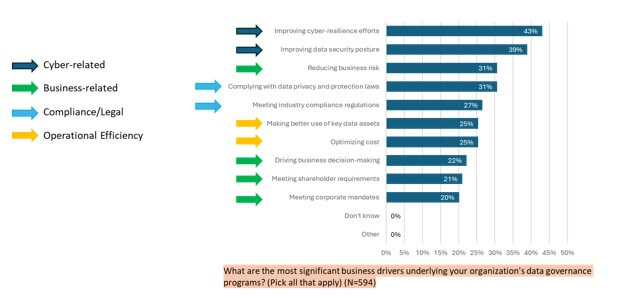Our recent cyber resiliency research examined the various trends impacting data governance and compliance, underscoring that cyber resiliency and the enhancement of data security posture are central to data-driven initiatives.
The Big 4
In the realm of data governance, organizations typically identify three primary business drivers that inform their infrastructural development and solution selection. The foremost driver is cybersecurity-related concerns.
Additionally, compliance and legal considerations play a pivotal role, with 31% of respondents prioritizing adherence to data privacy and protection legislation, and 27% focused on meeting industry compliance standards.
Operational efficiency also emerges as a significant factor in decision-making. It is noteworthy that, while optimizing the utilization of key data assets and reducing costs are acknowledged as important objectives, they do not rank as the most immediate priorities in the current landscape.
Lastly, business-related motivations further influence data governance; reducing business risk is recognized as the third most important driver by respondents.

Source: theCubeResearch, 2025
Wrapping Up
This finding indicates that cyber resiliency is integral to effective business risk management, reaffirming the premise that understanding data and bolstering its security posture are fundamental imperatives. This is critical in the age of AI, as we believe that there can be no meaningful deployment (at scale) without cyber-resilient and governed datasets. This should come as no surprise. This is not a new need in the enterprise, regardless of AI. There is work ahead for most organizations, to put it mildly.


